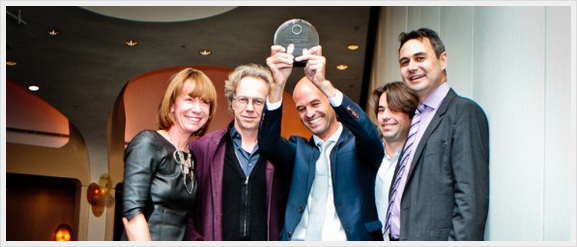
Photo: ITDP
Buenos Aires wins 2014 Sustainable Transport Award
10 February 2014
by Richard Forster
The City of Buenos Aires, Argentina, has become the 2014 winner of the 9th annual Sustainable Transport Award. The city was awarded this honour for its reduction in CO2 emissions, and improvements in safety for pedestrians and cyclists in the past year.
“The success of Buenos Aires proves that you can dream of a sustainable city,” said Guillermo Dietrich, Buenos Aires Secretary of Transportation, on receiving the award.
In 2013, Buenos Aires gave its 9 de Julio avenue, the widest avenue in the world, an extensive transit makeover. The city replaced several of 9 de Julio’s lanes of car traffic with bus-only lanes for a high-quality bus rapid transit (BRT) system. The BRT has 17 stations along the median, accommodating 11 bus lines and improving travel for 200,000 passengers per day.
In addition, Buenos Aires added a new 23-kilometre BRT corridor, Metrobus Sur, and has transformed dozens of blocks in the city centre into an environment that encourages walking and cycling over driving, and promotes a culture that prioritises people over cars.
“The downtown area, known as the microcentro, is a completely new pedestrian experience,” said Walter Hook, Chief Executive Officer of ITDP. “They reconstructed the streetscape with seating, bollards, way finding, and redesigned intersections that give priority to the pedestrian. This sends a powerful message that this is a city for people, not just for cars.”
Former Transportation Commissioner of the New York City Department of Transportation, Janette Sadik-Khan, hosted the awards ceremony. Also in attendance were representatives from the three cities receiving honourable mentions: Mr. Lee Jae-Joon, the 2nd Vice Mayor of Suwon, South Korea; Mr. Akash Tripathi, Collector for the iBus in Indore, India; and Mr. Wang Youping, Director of Project Management in Lanzhou, China.
Each of this year’s honourable mentions were notable for implementing big changes in mid-sized cities. Indore won for the successful implementation of iBus, the second true BRT corridor in India. iBus has set a new standard for public transport in India, providing a safe, efficient and high quality bus system for 30,000 passengers per day.
Suwon has made long-term improvements to its cycling and walking infrastructure following the 2013 EcoMobility World Festival. These improvements include wider pavements and cycle lanes, and the creation of five “pocket parks”.
Lanzhou’s BRT system, which began operation this year, is the second highest capacity system in Asia, after Guanghzou, also in China. The city was also notable for its integration of transit-oriented development projects along the corridor.
Established in 2005, the Sustainable Transport Award has been given annually to a city that has implemented innovative and sustainable transportation projects in the previous year. These strategies must improve mobility for all residents, reduce transport and air pollution emissions, and improve safety and access for cyclists and pedestrians.








